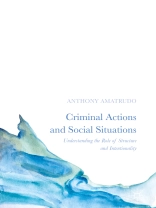This book develops a more nuanced, and technically rigorous, account of persons and groups in the context of intentional action and responsibility. Until now criminologists have taken groups as fairly straightforward associations and neglected the technical – and problematic – issues of how intention and action both structure membership and action. Amatrudo also assesses the often-overlooked fleeting nature of many groups and the overstated continuity of group membership, and this book has radical implications for the way we describe criminal groupings e.g. “criminal” groups with their loose bonds but tight sense of intentionality from criminogenic groups with their tight bonds and loose sense of intentionality. A key issue investigated here is the implications involved for people incarcerated on joint criminal enterprise charges and gang membership-related charges; and this timely topic will be of great interest to academics and students of Criminology, Law, Sociology and a variety ofother Social Sciences. The volume will also be useful for lawyers, social workers, community workers and others involved in the criminal justice system.
สารบัญ
Section 1. Technical and Analytical Considerations.- Chapter 2. The Central Problem of Collective Action.- Chapter 3. Collective Actions and Goals.- Section 2. Legal Considerations.- Chapter 3. Mobs, Masses and Treating People as Groups.- Chapter 4. Criminal Groups and Their Enterprise in UK Criminal Law and in International Law.- Section 3. Reality and Sociology.- Chapter 5. Real-life Cases: War Criminal Prosecutions and the Treatment of Membership of Illegal Organisations.- Chapter 6. The Gang in Criminological Literature.- Chapter 7. Drawing the Strands Together
เกี่ยวกับผู้แต่ง
Dr Anthony Amatrudo is Associate Professor of Criminology at Middlesex University School of Law, UK.












